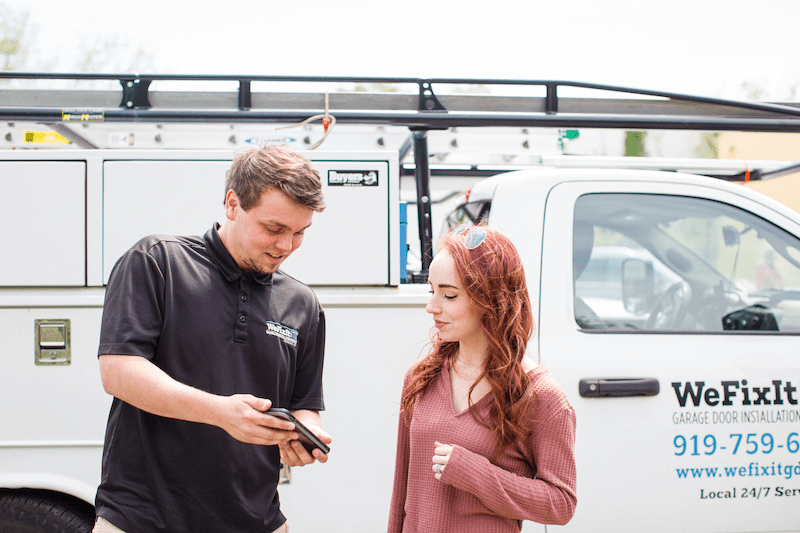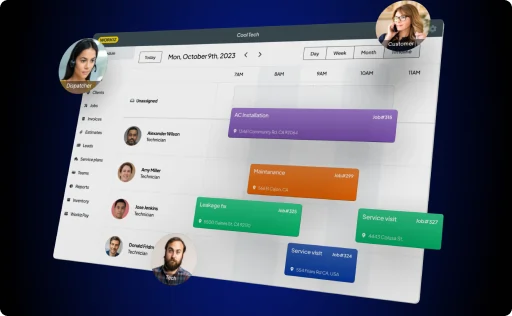A fee must be paid upon arrival for the initial visit, another at the end of each stage, and a final payment upon completion.
Even though these payment milestones are part of doing business, that doesn’t mean they don’t come with some uneasy feelings from time to time, even for the most grateful clients. In this piece, we’ll outline all those uncomfortable moments that might crop up when it comes to paying for your services. We’ll also discuss a solution that will hopefully make things easier for you and your clients.

5 moments in which you’ll have to discuss payments with your clients
-
When they negotiate the price
No service pro likes to hear clients asking for a lower price. It’s as if our services aren’t worth what we’re asking for them. But in most cases, being asked to give a discount isn’t personal. Your clients negotiate to get the best price they can, especially if they cannot afford to pay the total amount needed to complete the job. However, it would be best not to lower your rates every time a client asks for a price adjustment.
How can you handle the situation?
- Discuss payment terms upfront before getting your hands dirty. Hopefully, this will prevent clients from negotiating the price after you’re done and moving on to your next job.
- Give clients an estimate when they first contact you, preferably in writing, to avoid misunderstandings. You could easily create an estimate with Workiz and even generate a sale proposal (with “good, better, best” price options) to make your offer seem more fair and appealing.
2. When clients ask you to come back for cash the next day
Who likes going back to resolve payment issues? No one—especially if they think the job was done. Yet, nearly every service pro has a story about a two-hour commute just to get payment from a client they served the previous day. This is obviously frustrating and exhausting for you but also embarrassing for your clients—who might feel bad for you losing valuable money and time on the road.
How do you handle the situation?
- As suggested earlier, ask for payment upfront by providing a detailed estimate or a sale proposal.
- Offer a flexible payment plan – ask clients to pay you for a visit in advance (deposit) and charge for the job itself when it’s finished. Your clients will feel obliged to pay you the rest when you arrive. You can ask them for a long-term payment using the Sunbit installation. Remember to refund their money if you have to cancel the job for any reason.
- Enable your clients to pay in other methods aside from cash – you can always ask them to give their credit card information over the phone.
- If they feel uncomfortable giving credit card information over the phone (as they might), WorkizPay also makes it possible for you to receive payments online with no hidden fees. Just send the payment request alongside your estimate to have your client pay whenever they’re ready. And yes, WorkizPay accepts tips.
3. When clients think you overcharged them
If you’ve been in the trades for a while, you’ve probably heard, “That job should only take you five minutes,” or “Why do you charge so much if it only took you X hours?”
Naturally, that job only took you a short time because you’re a real pro who knows what to do in almost any situation. But your clients won’t always view it that way. Some still believe you should charge by the hour, even if you’ll end up spending most of the time doing nothing and missing other jobs.
How do you handle the situation?
- Discuss the payment method upfront – explain that you charge by the project, not by the hour, and create an estimate to show what services you offer for that particular project.
- Display similar projects you’ve completed for other clients to demonstrate that the payment is based on your quality of service, not just your hours worked.
4. When they’re late paying you
Do you find yourself giving up on payment because you get tired of chasing clients? If so, you’re not alone. Those phone calls and “kind” reminders to clients (who always come up with the most legitimate excuses not to pay) would wear out anyone. But better not let this become a habit. You can still maintain good relationships with clients who tend to miss their payment deadlines while collecting your well-deserved payment.
How do you handle the situation?
- Whenever possible, ask the client to pay on the spot with their device using WorkizPay’s client portal. No more payment due dates, no more anxiety about payment times—just a great first payment experience for both parties!
- Set your payment conditions beforehand – whenever clients ask to postpone the payment, give them a two-week deadline. Send them reminders after a few days and one week (these could even be automatic reminders sent via the Workiz Automation Center). Make sure you refer to the last-chance deadline as “the final deadline.”
- Keep track of your invoices using WorkizPay’s Invoice Tracking. Make sure you’re able to present these invoices in case of a chargeback dispute.
5. When they want to make sudden changes
Say you discussed payment, received a deposit, arrived at the job site, and halfway through the project, the clients changed their minds. Now what?
Ultimately, this will likely make obtaining their payment all the more difficult down the line. But let’s assume that their change of heart has nothing to do with you. Perhaps your client simply wants you to use tapestry rather than paint for a renovation, or they want you to reclean their floor with different materials.
How do you handle the situation?
- Take a deep breath – you could explain what you think is best for the client all you want, but in the end, it’s up to them to decide what they want.
- Stop whatever you’re doing – ask for a reassessment and show the client a new estimate, including what you’ve already done before going back to work. Make it clear that clients should still pay you for your efforts, even if they want to proceed with another service other than you, the one you provided them.
- When the client approves the new estimate, enforce even stricter payment terms to prevent them from changing their minds again. Ask to be paid on the spot when the job is done or no later than one week.
- If the service isn’t something you offer, charge for the visit and the work you’ve done so far and refer clients to a colleague or a subcontractor who can help them.
- Make sure the final estimate is updated using Workiz’ Invoice Tracking.
Final thoughts
Money—no one likes talking about it, but everyone needs to earn more of it for a reason to go to work every morning. Having said that, talking about money with your clients can be stressful, which is why we recommend you do it as little as possible and focus on the work that you love instead.
The key is to set the right expectations. Before your visit, make sure your clients are aware of your estimate, payment conditions, and cancellation policy. If possible, send them a personal link where they can pay for the job from their phone using their credit card, preferably right after the job is finished. But even if they must delay the payment, don’t worry about it more than you should. Keep track of your invoices using Workiz’s Invoice Tracking and send automatic payment reminders using the Workiz Automation Center.
If you’re new to field service management software, we suggest giving Workiz a try. See what it can do to make handling payments easier and much more accurate—a far better solution than any datasheet could ever provide. Try it now at: https://www.workiz.com/signup/welcome/









